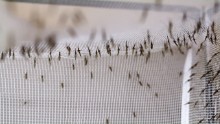
It's just a little sting, so slight often the victim doesn't even feel it.
But it's administered by the most dangerous animal in the world -- the female anopheles mosquito.
This insect sinking its mouth into human flesh to feed its unborn children killed 438,000 people in 2015 alone -- 90% of those fatalities were in Sub-Saharan Africa.
For
this region, malaria is still a crippling burden, estimated to cost
countries such as Nigeria and the Democratic Republic of Congo up to
1.3% of their GDP, according to the Malaria Consortium.
So imagine if this issue could be wiped out by a simple bar of soap.
That's what a Burkina Faso start-up is proposing.
A bar of soap
Faso Soap is the brainchild of Moctar Dembélé, of Burkina Faso, and Gérard Niyondiko, of Burundi.
Comprised
of Shea butter, lemongrass, African marigold and other natural
resources that are plentiful in Burkina Faso, it is designed to leave an
insect-repelling odor on the user's skin after washing.
It could be used to prevent against a wide range of mosquito-transmitted conditions -- perhaps eventually even Zika.
"Soap
is one product you can find in all African family homes, no matter how
poor they are," Niyondiko tells CNN. "Most people wash in the evening
and you want to be protected before you go to bed at night."
The majority of Africans, he adds, do not have access or the financial means to buy expensive repellents.
Suds that stick around
Getting
people to use the soap, the team knew, would be easy -- but making it
effective after it has been rinsed off would be hard.
"When
you use soap, you tend to rinse it off. So part of the effects of Faso
Soap would be thrown away," says Franck Langevin, campaigns director for
the Ouagadougou-based outfit.
"We
decided to combine the latest cosmetic technology with natural repellent
ingredients ... we put the natural ingredients into micro-capsules
around 100 to 150 micrometers in size, embedded in the soap. These are
small enough to stick onto the skin's pores.
"After
the soap is rinsed, the capsules remain and gradually break and release
the repellent little by little over a six to eight hour period."
The next step
In 2013, Dembélé and Niyondiko became the first African winners of the Global Social Venture Competition at the University of California Berkeley, winning $25,000.
Since
then, Faso Soap has been partnering with organizations that have
"competencies we don't", such as market-leading soap manufacturers in
West Africa, NGOs including Doctors Without Borders for distribution opportunities, and taking their product through rigorous scientific testing so they can bring it to market.
"Once
we have the hard scientific data on the soap and its effectiveness in
preventing against malaria, we want to approach national and
international entities for subsidies," Langevin says.
While
markets such as Asia could be more profitable, the group are keenly
focused on providing cheap access to the soap to those in need in
Africa.
They have set a goal for Faso Soap to save 100,000 lives by 2018.
A possible protection against Zika?
The
possibilities for Faso Soap don't end with malaria. Other mosquito
transmitted diseases -- such as Zika -- could also be prevented by the
product.
More research needs to be done in this area.
"Zika
is transmitted by the Tiger mosquito, which looks the same but is
actually very different. We need to know to what extent we can be
effective with essential oils," says Langevin.
"For now, working on malaria is a big enough challenge -- it kills way more people than Zika.
"A child dies from malaria every two minutes."

No comments:
Post a Comment